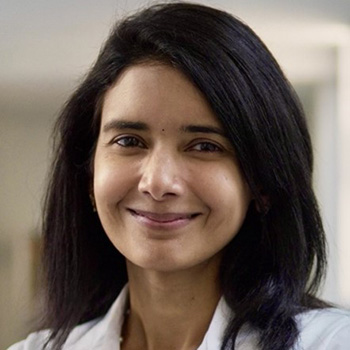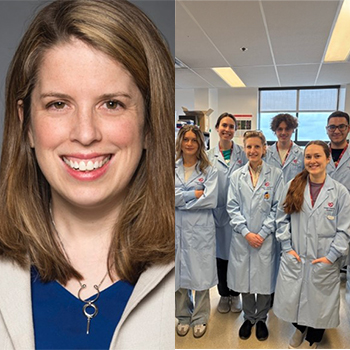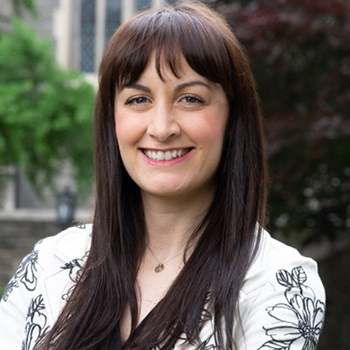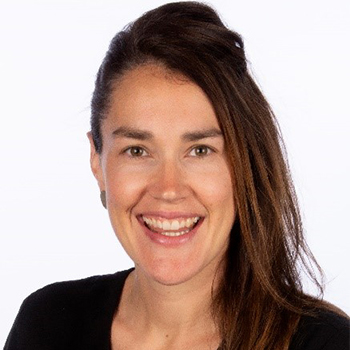Embracing Diversity – Faces of Health Research
-
Embracing heterogeneity in dietary intake to achieve healthy lives for all
Rachel Murphy

Institution: University of British Columbia, BC Cancer
Current position: Associate Professor
Bio: Dr. Murphy is an Associate Professor in the School of Population and Public Health at The University of British Columbia and a Senior Scientist at BC Cancer. Dr. Murphy's interdisciplinary research program focuses on the intersections of public health, nutrition and human health. Her research uses systems biology approaches and epidemiologic data to provide novel insight on diet and health relationships, including a focus on the upstream determinants of dietary intake and dietary inequities. The long-term goal is to promote healthy eating to achieve healthy lives for all.
Study overview: Dr. Murphy is the Nominated Principal Investigator for a CIHR team grant competition entitled 'Embracing Diversity to Achieve Precision and Increase Health Equity'. The team including Drs. Sharon Kirkpatrick, Jennifer Vena, Parveen Bhatti, Benoît Lamarche, the participant advisory committee and others, will explore why dietary intake and the impacts of diet on health vary. The team will draw on the largest source of dietary intake in Canada – the Healthy Eating and Supportive Environments (HEAL) study which includes participants with diversity in ethnicity, gender, income and education. Biological, environmental and social factors will be integrated to understand why some people have better quality diets, and others have poorer quality diets. The team will also study how diet is related to measures of metabolic health and test whether measures of metabolism can help explain why people can eat similar things but some stay healthy, and others develop disease. The findings are an important step towards tailoring dietary guidance for Canadians.
Personal Quote: Our work will provide foundational evidence on how systems interact to shape differences in dietary intake and metabolic health. This is critical to improving dietary intake and health through informing the right intervention to the right population, at the right time.
Further reading:
-
Elucidation of the Individualized Response to an 8-year Lifestyle Intervention aimed at Reducing Cardiometabolic Risk in Young Women before, during and after Pregnancy
Ravi Retnakaran

Institution: University of Toronto and Mount Sinai Hospital in Toronto
Current Position: Professor / Endocrinologist and clinician-scientist
Bio: Dr. Ravi Retnakaran is a Professor of Medicine at the University of Toronto and an endocrinologist and clinician-scientist at Mount Sinai Hospital in Toronto, Canada, where he holds the Boehringer Ingelheim Chair in Beta-cell Preservation, Function and Regeneration. He was awarded the 2013 Dr. Charles Hollenberg Young Investigator Award by the Canadian Society of Endocrinology and Metabolism and the 2014 Joe Doupe Award from the Canadian Society of Clinical Investigation. In 2020, he was named to the Canadian Academy of Health Sciences. In 2022, he received the Diabetes in Women award from the International Diabetes Federation.
Study Overview: His research program focuses on the pathophysiology and treatment of type 2 diabetes (T2DM), with a particular interest in the potential reversibility of pancreatic beta-cell dysfunction early in the course of diabetes. In this context, his research group has been conducting a series of innovative clinical trials evaluating novel therapeutic strategies for the preservation of beta-cell function in early T2DM. In addition, his research program has championed the concept that a women’s gluco-regulatory response to the metabolic challenge posed by pregnancy can provide unique insight into her future risk of T2DM and cardiovascular disease.
Personal Quote: The critical window from preconception to the postpartum offers a unique opportunity for potentially reducing the long-term future risks of diabetes and heart disease in women.
Further reading:
-
Nutrition and Precision Health Equity for Black People in Canada
Bukola Salami

Institution: University of Calgary
Current Position: Full Professor; Tier 1 Canada Research Chair in Black and Racialized Peoples' Health
Bio: Professor Bukola Salami is a Full Professor and Tier 1 Canada Research Chair in Black and Racialized Peoples' Health in the Department of Community Health Sciences at the Cumming School of Medicine, University of Calgary. Professor Salami's internationally recognized research program focuses on the policies and practices that shape migrant health and the health of Black communities. She has contributed to more than 100 funded research projects, with a cumulative value exceeding $250 million. In 2020, she established the Black Youth Mentorship and Leadership Program, a pioneering initiative that supports the development of young Black leaders.
She currently serves as Vice President of the Canadian Nurses Association and is a member of the Governing Council of the Social Sciences and Humanities Research Council of Canada (SSHRC). She also contributes her expertise as a board member of the CIHR Institute of Human Development, Child and Youth Health; the Public Health Agency of Canada's Advisory Committee on Science; and the Scientific Advisory Committee on Global Health to the Government of Canada.
Personal Quote: Our innovative project aims to generate comprehensive and precise insights into the health status of Black people in Canada by examining biological indicators, the impact of anti-Black racism and other social determinants, as well as nutritional factors.
-
A BEACON for change: Unravelling social disparities in aging
Parminder Raina

Institution: McMaster University
Current Position:
- Professor, Department of Health Research Methods, Evidence, and Impact (HEI)
- Raymond and Margaret Labarge Chair in Research and Knowledge Application for Optimal Aging
- Scientific Director, McMaster Institute for Research on Aging
- Scientific Director, Labarge Centre for Mobility in Aging
- Lead PI, Canadian Longitudinal Study on Aging
Bio: Dr. Parminder Raina is a Professor in the Department of Health Research Methods, Evidence, and Impact at McMaster University. He specializes in the epidemiology of aging with emphasis on developing the interdisciplinary field of geroscience. He has expertise in epidemiologic modeling, large population-based longitudinal research, and knowledge mobilization. He is a fellow of the Canadian Academy of Health Sciences and holds the endowed Raymond and Margaret Labarge Chair in Research and Knowledge Application for Optimal Aging. Dr. Raina became a member of the Order of Canada in 2022 for his research in aging. He is the founding Scientific Director of the McMaster Institute for Research on Aging and the Labarge Centre for Mobility in Aging. He is the Lead Principal Investigator of the Canadian Longitudinal Study on Aging, one of the most comprehensive research platforms on health and aging in the world.
Study Overview: My research through the Social BEACON Initiative aims to unravel how social disparities influence aging processes, using a multi-omics approach to explore the biological pathways linking social disparity to health outcomes. By identifying the biological signatures of social disparity, our work seeks to inform the development of intervention strategies that promote equitable and healthy aging for all.
Personal Quote: Through Social BEACON, we are investigating the biological mechanisms that link social disparities with aging, aiming to generate insights that will help inform the development of more targeted strategies for reducing health inequities and improving aging outcomes for all.
Further reading:
- Parminder Raina - MIRA
- Research Platform for Health & Aging - Canadian Longitudinal Study on Aging (CLSA)
- Parminder Raina - Google Scholar
X:
-
Examining intersections of biographies & biologies: diversity & outcomes of people with multiple sclerosis in Canada (iBio2Div-MS)
Ruth Ann Marrie

Institution: Dalhousie University
Current Position: Professor
Bio: Dr. Marrie is a Professor of Medicine and Community Health and Epidemiology at Dalhousie University, where she serves as the Multiple Sclerosis Clinical Research Chair. She received her undergraduate degree in chemistry and her medical degree from Dalhousie University, both with Distinction. She completed neurology training at McGill University. This was followed by a fellowship in Multiple Sclerosis at the Cleveland Clinic, supported by a Sylvia Lawry Physician Fellowship Award from the National Multiple Sclerosis Society. Subsequently, she obtained a PhD in Epidemiology from Case Western Reserve University. Presently, she serves as the Vice Chair of the Scientific Steering Committee for the International Progressive MS Alliance. She is the former Chair of the Medical Advisory Committee for MS Canada, former Chair of the International Advisory Committee on Clinical Trials in MS and a Fellow of the Canadian Academy of Health Sciences. In 2023 she was awarded the Barancik Prize for Innovation in Multiple Sclerosis Research. Her research aims to understand the influence of comorbid diseases and other factors on a range of multiple sclerosis (MS)-related health outcomes. Other areas of research interest include etiologic factors for MS, patient-reported outcomes, and prodromal MS.
Personal Quote: Our work will elucidate the individual and joint contributions of biological and biographical factors to disparities in health outcomes of people with multiple sclerosis (MS), and pragmatically assess interventions to address contextual and biographical factors affecting the health of people with MS in Canada.
Further reading:
-
Nature versus nurture of glucose homeostasis trajectories in children across different ancestries
Despoina Manousaki

Institution: University of Montreal
Current Position: Assistant Professor
Bio: Dr. Manousaki is an Assistant Professor in the Department of Pediatrics at the University of Montreal. She is a Fonds de Recherche du Quebec Santé Junior 1 Scholar, and recipient of an ENRICH career development award in 2020. Dr. Manousaki's research focuses on the genetics of complex disease in childhood. Her team uses genomics, bioinformatics, and genetic epidemiology methods to better understand the genetic architecture of complex disease, and to apply these findings to predict disease risk and develop new disease biomarkers. Her research interests lie in the field of genetics of type 1 and type 2 diabetes in children, pediatric obesity, growth and puberty.
Study Overview: Dr. Manousaki is the Nominated Principal Investigator for a CIHR team grant competition entitled 'Team Grants: Embracing Diversity to Achieve Precision and Increase Health Equity'. Using polygenic risk scores, Dr. Manousaki's lab works with the labs of Dr. Henderson, Dr. Dabelea, Dr. Wicklow, Dr. Timpson, Dr. Bherer and Dr. Greenwood to define how gene and environment interact in the context of dysglycemia and type 2 diabetes pathogenesis in youth across ancestries. Leveraging existing youth cohorts of diverse ancestries from Canada, the United States and the UK, this team proposes a research which will build capacity in the research field of diabetes in youth, by supporting the development of an early prediction tool for youth dysglycemia using human genetics and known risk factors. By expanding our understanding of the pathophysiology of glucose metabolism trajectories in youth, this project will enhance precision medicine in the practice of those diagnosing and treating youth with diabetes of diverse ancestries, including Canadian First Nations children, who present the highest reported rates of type 2 diabetes worldwide. Through partnerships with community leaders, patients, families and stakeholders from various physician organizations and public health, the findings from this study will ultimately inform strategies for early detection of dysglycemia to facilitate targeted and appropriately timed prevention.
Personal Quote: Our work will identify how genes interact with lifestyle and sociodemographic factors to determine the risk to develop type 2 diabetes and its early stages in youth across various ancestries. This is a critical first step toward developing targeted lifestyle interventions to prevent early onset of type 2 diabetes in children and adolescents.
-
Changing the Trajectory of Inflammatory Arthritis in Indigenous Populations
Cheryl Barnabe

Institution: University of Calgary
Current Position: Professor, and Director of the McCaig Institute for Bone and Joint Health
Bio: Dr. Cheryl Barnabe, MD, MSc FRCPC is a Rheumatology Clinician Scientist and Professor in the Departments of Medicine and Community Health Sciences, Cumming School of Medicine, University of Calgary. She is the Director for the McCaig Institute for Bone and Joint Health, and a Senior Scientist with Arthritis Research Canada. She holds a Canada Research Chair in Rheumatoid Arthritis and Autoimmune Diseases and is the Arthur JE Child Chair in Rheumatology Outcomes Research. She is a proud member of the Otipemisiwak Metis Government, and was the nominated Principal Investigator for the Alberta Indigenous Mentorship in Health Innovation (AIM-HI) Network, funded by the CIHR Indigenous Mentorship Network Program.
Study Overview: Her research program identifies drivers of rheumatoid arthritis outcomes in Indigenous community members, including environmental exposures and disparities in social determinants of health. She works with communities to identify, co-create, implement and evaluate promising health system interventions to improve access to diagnosis, treatment, and quality of care. In the CIHR Team Grant 'Indigenous Inflammatory Arthritis Prevention and Treatment approaches for Health equity (IIA-PATH)', the research team will conduct community-based screening to identify persons at risk for inflammatory arthritis conditions. Immunologic information will be integrated with data about protective and detrimental environmental, social and health determinant exposures to predict the risk for inflammatory arthritis onset, and participants will be offered interventions to redirect the disease trajectory. A suite of patient-centered arthritis wellness care models developed with community and that align with Indigenous approaches for health and support will be implemented.
Personal Quote: There has been tremendous innovation in rheumatoid arthritis management over the last 3 decades, and yet we continue to see the devastating impacts of this disease in Indigenous community members. We have the opportunity to redirect our approaches in care and support those at-risk for and affected by rheumatoid arthritis in ways that are congruent with cultural practices and supports for improved outcomes.
Further reading:
-
Building the Framework to Tackle the Inequities of Access to and Outcomes for People Needing Liver Transplant in Canada
Mamatha Bhat

Institution: University Health Network
Current Position:
- Hepatologist & Co-Lead of Transplant AI initiative (TAI), Ajmera Transplant Centre
- Scientist, Toronto General Hospital Research Institute, University Health Network
- Associate Professor, Division of Gastroenterology & Hepatology
- Director, Clinician-Scientist Training Program (CSTP), Department of Medicine, University of Toronto
- Partnerships & Engagement Lead, Temerty Centre for AI in Research & Education in Medicine (T-CAIREM)
- Faculty Affiliate, Vector Institute for Artificial Intelligence
Bio: Liver disease affects over three million Canadians and causes more than 5,000 deaths each year. A liver transplant can be life-saving—but not everyone has the same chance to get one. Right now, some people face unfair barriers to being referred for a transplant, receiving an organ, or recovering well afterward. These gaps are often linked to things like income, race, gender, or where a person lives.
Thanks to funding from the CIHR Team Grants: Embracing Diversity to Achieve Precision and Increase Health Equity, our national team of healthcare providers, scientists, and patient partners is working to make the Canadian liver transplant system fairer and more accessible using cutting-edge research methods in advanced modelling and artificial intelligence (AI).
Study Overview: We aim to understand why some groups have less access, create a more equitable organ distribution system, and improve long-term health outcomes after transplant, especially for those from disadvantaged backgrounds. We also know new technologies can raise concerns, especially if they reflect existing biases. That's why we're creating spaces for open dialogue with patients, doctors, and technology experts to build trust. By combining science, technology, and lived experience, this project aims to create a more inclusive liver transplant system—so every Canadian who needs a new liver has a fair chance at a healthy future.
Personal Quote: Our goal is to harness the power of AI to build a more equitable and compassionate liver transplant system for every Canadian who needs a new liver.
Further reading:
-
Optimizing STBBI health outcomes through precision health
Naveed Janjua

Institution: University of British Columbia
Current Position: Director, UBC Centre for Disease Control
Bio: Dr. Naveed Janjua is the Director of the University of British Columbia Centre for Disease Control (UBC CDC) and a Clinical Professor at the School of Population and Public Health, University of British Columbia, and the Executive Director of Research at the BC Centre for Disease Control (BCCDC). His research focuses on infectious diseases—including hepatitis B, hepatitis C, and COVID-19—health disparities, health outcomes, and the effectiveness of prevention and treatment interventions to generate real-world evidence. He uses large, real-world data cohorts, such as the BC Hepatitis Testers Cohort and the BC COVID-19 Cohort, to conduct high-impact research that has informed clinical practice and public health policies both nationally and internationally.
Study Overview: Dr. Janjua is the Nominated Principal Investigator for a CIHR team grant competition Embracing Diversity to Achieve Precision and Increase Health Equity, leading the team grant entitled Optimizing STBBI Health Outcomes Through Precision Health. The team will leverage a population-based cohort integrating laboratory, surveillance, and administrative data in British Columbia to characterize "syndemics" and the intersectionality of social conditions, sexually transmitted and blood-borne infections (STBBIs), and chronic diseases to identify commonalities and differences across population groups. The team will identify and evaluate interventions designed to address these conditions using a precision public health, with the goal of improving health outcomes and advancing health equity.
Personal Quote: We will apply a precision public health approach to design precise and tailored interventions and delivery methods to address syndemics of social conditions, co-infections and co-morbidities to better serve the healthcare needs of diverse groups of people affected by STBBIs.
Further reading:
-
The British Columbia CARMA-CHIWOS Collaboration (BCC3): Reaching Further
Hélène Côté

Institution: University of British Columbia
Current Position: Professor
Bio: Dr. Côté is a Professor in the Department of Pathology and Laboratory Medicine at the University of British Columbia. She is one of the principal investigators of the British Columbia CARMA-CHIWOS Collaboration (BCC3) study, a community-based research study on healthy aging among women living with and without HIV. Initiated in 2020, BCC3 united two CIHR-funded Canadian cohorts of women living with HIV: CARMA and CHIWOS - combining CARMA's biospecimens and control women without HIV, CHIWOS' community-based approach and focus on psycho-social determinants of health. Her research program aims to better understand how HIV, other STBBI, and hormone exposures influence aging processes, such as immune aging, inflammation, and mitochondrial function, while considering other factors that can impact health and lifespan.
Study Overview: Dr. Côté is the nominated principal investigator for a CIHR Team Grant competition entitled 'Embracing Diversity to Achieve Precision and Increase Health Equity'. Alongside co-principal applicants Dr. Melanie Murray, Dr. Elizabeth King, Dr. Mona Loutfy, Shelly Tognazzini, and the many other BCC3 team members, guided by community, the grant will expand BCC3 to allow second visits, and include more participants who are under-represented in research but often over-affected by HIV/STBBIs, including those living outside large urban centers, immigrants, and transgender and nonbinary individuals. The study will examine how STBBI and hormone exposures relate to aging indicators, considering sex and gender. This knowledge will help tailor equitable approaches to promote healthy aging.
Personal Quote: Our work will help understand why women living with HIV experience shorter health and lifespan than both men with HIV or women without HIV, and identify actionable factors, to ultimately promote healthy aging equity.
Further reading:
-
All Together 4 IDEAS: Inclusivity, Diversity, Equity, to Address drivers and interventions to curtail the Syndemics experienced by people diagnosed with HIV and Sexually Transmitted and Blood-Borne Infections
Zulma Rueda

Institution: University of Manitoba
Current Position: Associate Professor and Canada Research Chair in Sexually Transmitted Infection (STI)- Resistance and Control
Bio: Dr. Zulma Rueda is an MD, PhD, Associate Professor and Canada Research Chair in Sexually Transmitted Infection (STI)- Resistance and Control at the University of Manitoba. She leads the Exposome Lab and the AllTogether4IDEAS team. Her main research revolves around respiratory tract infections, including tuberculosis among people deprived of liberty, HIV and sexually transmitted infections. The projects apply a transdisciplinary approach to understanding the exposome and syndemics affecting marginalized and understudied populations.
Study Overview: Dr. Rueda is the nominated principal investigator of a CIHR team grant entitled: "All Together 4 IDEAS: Inclusivity, Diversity, Equity, to Address drivers and interventions to curtail the Syndemics experienced by people diagnosed with HIV and Sexually Transmitted and Blood-Borne Infections". The co-principal applicants include Monica Cyr at Aboriginal Health and Wellness Centre of Winnipeg, Dr. Yoav Keynan and Margaret Haworth-Brockman at the University of Manitoba, and Dr. Katharina Maier at the University of Winnipeg. This transdisciplinary team, composed of 37 team members, will examine the interaction between social and structural determinants of health, and epidemiological, clinical, and biological exposures to understand and address the HIV and STBBI incidence in Manitoba, and evaluate new Indigenous and community-led strategies to increase access and engagement to HIV and STBBI care.
Personal Quote: Our work will lead to better access and follow-up for those who face structural and social barriers to receiving the care they need, and help to curb the HIV and concurrent STBBI epidemics.
Further reading:
-
Heart Health and Endocrine Disruption during Aging: Risk from Type 2 Diabetes in Women Incurring Sleep Disruption
Erin E Mulvihill

Institution: University of Ottawa
Current Position: Scientist, University of Ottawa Heart Institute, Associate Professor, Department of Biochemistry, Microbiology and Immunology, University of Ottawa
Study Overview: Women with type 2 diabetes mellitus (T2DM) face a higher risk of cardiovascular disease (CVD) compared to men with T2DM. This risk escalates even further during perimenopause as women undergo significant hormonal shifts, changes in body composition, and increased cardiometabolic risk factors, such as dyslipidemia and low-grade inflammation. Women in perimenopause also disproportionately report sleep disturbance, which is well characterized to promote a pro-inflammatory milieu and deteriorate cardiometabolic health. However, the interplay between T2DM, perimenopause, sleep disruption, and its potential to converge and further elevate CVD risk is poorly studied. Therefore, we hypothesize that perimenopause and sleep disruption promote low-grade inflammation and impair incretin signaling, leading to poorer diabetes management, increased CVD risk and heightened cardiometabolic dysfunction.
Completion of our proposal will address the urgent and unmet need for precision medicine to tailor interventions to women's specific biological, hormonal, and metabolic profiles in this life stage.
Personal Quote: We hope completion of this CIHR funded project will lead to better ways to manage diabetes and heart risks in women experiencing peri and menopause. These experiments are designed to understand the contribution of higher stress levels, inflammation and sleep issues to the higher risk of heart disease for perimenopausal women living with diabetes.
Further reading:
-
EQUIP Re-CKD: EQUity In Predicting Re-hospitalization among people with Chronic Kidney Disease
Meghan Elliott

Institution: University of Calgary
Current Position: Nephrologist and Associate Professor in the Departments of Medicine and Community Health Sciences at the University of Calgary.
Biography: Dr. Meghan Elliott is a nephrologist and Associate Professor in the Departments of Medicine and Community Health Sciences at the University of Calgary. She is the recipient of a KRESCENT New Investigator Award (2019-2022; Kidney Foundation of Canada and CIHR) and currently leads the Interdisciplinary Chronic Disease Collaboration’s patient engagement platform. Dr. Elliott’s research program is focused on understanding the care needs, gaps, and priorities of people living with chronic kidney disease (CKD). The goal of this work is to promote shared decision-making and improve the experiences and outcomes of patients and their families as they navigate the health system.
Study Overview: Dr. Elliott is the Nominated Principal Investigator for a CIHR team grant competition entitled, ‘Embracing Diversity to Achieve Precision & Health Equity’. Her team, including Drs. Maoliosa Donald, Tyrone Harrison, and Pietro Ravani from the University of Calgary, will explore the interplay between social determinants of health (such as employment, education, social context, and healthcare access) and hospital readmissions for people living with CKD. Her team will use a variety of research methods, including machine learning and community-based approaches, to develop a strategy for preventing hospital readmission among those at highest risk. In partnering with researchers, clinicians, patients, and community organizations from across Canada, this work will support individualized, health equity-focused care for people with CKD.
Personal Quote: “I am thrilled to be a part of this collaborative, interdisciplinary team that will help to shed light on how the social circumstances of people living with kidney disease influence their access to hospital-based care. This work will be an important step toward personalizing medical and social supports for those with greatest need.”
Further reading:
-
Developing a Precision Participatory and Multi-Level Approach for Population-Based Diabetes Risk Assessment to Address Inequities in Type 2 Diabetes
Laura C Rosella

Institution: University of Toronto
Current Position: Professor; Chief Scientist; Canada Research Chair in Population Health Analytics
Biography: Dr. Rosella is a Professor in the Division of Epidemiology at the Dalla Lana School of Public Health, University of Toronto, where she holds Canada Research Chair in Population Health Analytics. She is the Chief Scientist and Stephen Family Research Chair in Community Health at the Institute for Better Health, Trillium Health Partners. She is the Editor-in-Chief of the Canadian Journal of Public Health, a member of the Royal Society of Canada’s College of New Scholars, and the recipient of the 2025 Mid-Career CIHR Institute of Population and Public Health Trailblazer Award. Dr. Rosella’s research focuses on generating new methods and data applications to improve population health, reduce health inequities, and enhance community wellbeing. A critical area of research in her lab is developing and validating her Population Risk Tools (PoRTs) to accurately estimate the future risk of high-burden conditions and chronic diseases that are used to inform prevention planning and resource allocation.
Personal Quote: “Our work will co-design a locally relevant multi-level framework for diabetes prevention with community partners and members with lived experience to comprehensively understand inequities in diabetes risk and develop practical ways to manage and prevent it.”
Further reading:
-
Let’s be precise: harnessing the diversity of the CHILD Cohort Study to improve asthma outcomes for all
Padmaja Subbarao

Institution: The Hospital for Sick Children; University of Toronto
Current Position: Clinician-Scientist in Pediatric Respiratory Medicine, SickKids Hospital
Director of the CHILD Cohort Study
Canada Research Chair Tier 1 Chair in Pediatric Asthma and Lung Health at the University of Toronto.
Biography: Dr. Padmaja Subbarao is a Clinician-Scientist in Pediatric Respiratory Medicine specializing clinically in severe asthma at SickKids Hospital. She is the Director of the CHILD Cohort Study and holds a CRC Tier 1 Chair in Pediatric Asthma and Lung Health at the University of Toronto. She is also the Co-Lead of Precision Child Health and Associate Chief, Clinical Research at the SickKids Research Institute. Trained in both Epidemiology and infant and preschool lung physiology, she holds appointments as a Senior Scientist in Translational Medicine and as a Professor in the Departments of Pediatrics, Physiology and in the Dalla Lana School of Public Health. Dr. Subbarao’s research focuses on early-life determinants of asthma, including lung function development, environmental exposures, and the gut microbiome. Her program aims to identify novel asthma subtypes, develop biomarkers for precision medicine, and build clinical trial platforms to improve prevention and treatment for young children.
Study Overview: Dr. Subbarao is the Nominated Principal Investigator for a CIHR – Embracing Diversity to Achieve Precision & Health Equity team grant entitled ‘Let's be precise: harnessing the diversity of the CHILD Study to improve asthma outcomes for all’. Using data from the CHILD Cohort Study, which has followed over 3,400 diverse Canadian children from birth into adolescence, Dr. Subbarao along with leads, Dr. Meghan Azad, Dr. Anne Gadermann, Dr. Zihang Lu and Dr. Stuart Turvey, will examine how race, ethnicity, gender, and family circumstances interact with the microbiome to influence asthma risk. With a goal to develop more inclusive, personalized asthma treatments, this research will help uncover why asthma affects some children more than others and will point to new, more equitable approaches to asthma prevention, to ultimately reduce the burden of asthma on children and families everywhere.
Personal Quote: “Asthma is a complex disease due to several biological and environmental factors. Precision Child Health is helping us understand how these factors interact and point to more equitable and effective prevention strategies. By tailoring care to the unique needs of each child, we can ultimately improve outcomes for all children with asthma.”
Further reading:
-
Transforming Sepsis Care: Robust prediction and decision making leveraging the Social Determinants of Health
Rahul Gopalkrishnan

Institution: University of Toronto & Vector Institute
Current Position: Assistant Professor, Computer Science & Laboratory Medicine and Pathobiology
Tier II Canada Research Chair in Computational Medicine
Canada CIFAR AI Chair
Biography: Rahul G. Krishnan develops reliable AI platforms that translate high‑dimensional biomedical data into actionable biological and clinical insights. He holds a Tier II Canada Research Chair in Computational Medicine at the University of Toronto and is a Canada CIFAR AI Chair at the Vector Institute. Krishnan’s lab blends causal inference with deep learning to tackle high‑stakes problems across the diagnostic and therapeutic continuum. His recent research includes foundation models for computational pathology, predictive tools that flag intensive care unit (ICU) patients who will need critical laboratory tests, and risk scores that reduce disparities on the liver‑transplant wait‑list. Looking ahead, his team is embedding the social determinants of health into biology-guided AI models for hospital‑acquired infections, aiming to deliver decision support that is both accurate and fair across diverse patient populations. Dr. Krishnan received his MS from New York University and his PhD in Electrical Engineering and Computer Science from MIT in 2020.
Personal Quote: Large language models and multimodal AI systems will transform medicine—but only if we build and test them rigorously with the clinicians and patients who rely on them.
Further reading:
-
Improving clinical outcomes of infections in people who use drugs
Valérie Martel-Laferrière

Institution: Université de Montréal
Current Position: Associate Professor ; Principal Scientist
Biography: Dr. Valérie Martel-Laferrière is an Associate Professor of Clinic in the Department of microbiology, infectious diseases and immunology at Université de Montréal and a Principal Scientist at the Centre de recherche du Centre hospitalier de l’Université de Montréal. After a training in medical microbiology and infectious diseases, she specialized in viral hepatitis. Her research program now focuses more broadly on infectious diseases among people who use drugs. With her collaborators, she is studying the effectiveness of providing HIV pre-exposure prophylaxis and HCV treatment within service programs already attended by people who use drugs. She is also the nominated principal applicant of a CIHR Team Grant that will explore the impact of intersectional inequalities faced by women who use drugs with regards to sexually-transmitted and blood-borne infections. A better understanding of these women's realities will enable the development of more individualized services that better meet their needs. People who use drugs are disproportionately affected by some viral (HIV, hepatitis C) and bacterial (skin and soft tissue infections, endocarditis, osteitis) infections. In parallel, these people face numerous individual and systemic barriers when trying to access medical care. Understanding these barriers and developing tailored interventions is essential to improving their health outcomes.
Personal Quote: “As an infectious disease specialist, I cannot solve all the problems faced by people who use drugs. But if I can help simplify the pathways that enable them to access quality care that meets their needs, I will feel that my research program has achieved its objective.”
Further reading:
-
Reclaiming the Traditional Practice of Breastfeeding for First Nations, Inuit and Métis Families: Breaking Down Barriers within the Healthcare System
Nathan Nickel

Institution: University of Manitoba
Current Position: Director, Manitoba Centre for Health Policy; Associate Professor, University of Manitoba; Scientist, Children’s Hospital Research Institute of Manitoba
Biography: Dr. Nathan Nickel is the Director of the Manitoba Centre for Health Policy, an Associate Professor in the departments of Community Health Sciences and Kinesiology at the University of Manitoba, and Scientist at the Children’s Hospital Research Institute of Manitoba. Dr. Nickel is an applied population health scientist who leverages whole-population administrative data to conduct health and social policy research. Nickel’s research program uses a cross-disciplinary, team-science approach, partnering with scientists, community, and government policy- and decision-makers to generate actionable evidence to improve population health and well-being. His trainees have received over $900K in funding from local, provincial, and federal agencies including CIHR Vanier awards. Nathan’s work examines parent-child health and mental health outcomes within the contexts of the social and structural determinants. In 2019, he was inducted into the US National Honor Society for Public Health for excellence in research and service in population health.
Drs Phillips-Beck, Fowler Woods, Clark, and Nickel are Co-PIs for a CIHR team grant to support breastfeeding. They are partnering with the Breastfeeding Committee for Canada and First Nations, Inuit, and Métis communities to use Indigenous knowledge and methodologies to reclaim the traditional practice of breastfeeding.
Personal Quote: Breastfeeding is the traditional way that Inuit, First Nations, and Métis people have fed their children since time immemorial. Our team is working with community and the Breastfeeding Committee for Canada to support the continuation of this long standing sacred practice.
Further reading:
-
Advancing Health Equity and Preventive Cardiovascular Care in Indigenous and Remote Communities: A Mobile Healthcare Unit
Marie-Ève Piché

Institution: Laval University
Current Position: Cardiologist, Institut Universitaire de Cardiologie et de Pneumologie de Québec ; Associate Professor of Medicine, Laval University
Biography: Dr Piché is an early-career preventive cardiologist at the Institut Universitaire de Cardiologie et de Pneumologie de Québec and associate professor of medicine at Laval University. Her work has focused on inclusivity and advancing health equity, particularly in the context of Indigenous health and underrepresented/underserved populations. Dr Piché’s doctoral research on sex-specific cardiovascular risk factors laid the groundwork for her continued focus on Indigenous women’s health. At the University of Oxford, her postdoctoral work explored further the intersection of ethnicity and cardiometabolic health. In 2023, Dr. Piché launched Canada’s first Hub for Inclusive Health and Prevention, assuming a leadership role in addressing healthcare inequities through early detection, culturally adapted interventions, and enhanced access to cardiovascular care for Indigenous and remote communities. Her research emphasizes collaborative, community-engaged approaches to reducing health disparities, particularly among Indigenous populations, with a focus on culturally safe and accessible preventive cardiovascular care. She has established meaningful partnerships with Indigenous leaders and communities, bridging research with real-world health impact, notably through the creation of a Mobile Healthcare Unit to deliver culturally safe cardiovascular care directly to Indigenous and remote communities. As part of her commitment to reconciliation and health equity, she co-developed the first heart health clinic located on reserve and dedicated to Indigenous women in Canada.
Dr. Piché is the Nominated Principal Investigator for a CIHR-Team Grant: Embracing Diversity to Achieve Precision & Health Equity competition entitled ‘Advancing Health Equity and Preventive Cardiovascular Care in Indigenous and Remote Communities: a Mobile Healthcare Unit’.
Study Overview: In collaboration with Indigenous leaders Nadine Rousselot, Anne-Frederick McKenzie, Raven Larocque-Laliberté, community members, Indigenous people with lived/living experience, patient partners, national and international experts in Indigenous Health, Dr. Piché’s lab co-develops cardiovascular awareness and screening initiatives using a Mobile Healthcare Unit delivering culturally safe specialized care, including advanced imaging, directly to Indigenous communities. These efforts target individuals who are not routinely engaged with traditional healthcare services, with a focus on the early detection and management of cardiovascular risk factors and conditions. The program is also designed to assess its effects on key health outcomes, healthy behaviors, and participant experience. Collectively, the data will enhance our understanding of the contextual, environmental, sociocultural, and individual factors influencing Indigenous health. Information gathered through this initiative will support Indigenous communities in developing locally driven strategies for preventive care. By integrating technology and precision medicine, this approach not only addresses the health needs of underserved Indigenous and remote communities, but also supports sustainable health system improvements and self-determination through training, mentorship, and community capacity building. Designed to advance health equity, our Team will demonstrate the effectiveness of Indigenous-led approaches in improving cardiovascular health and reducing healthcare disparities. Central to this work is the empowerment of Indigenous communities to shape healthcare systems, advocate for structural change, and co-create inclusive and sustainable solutions that reflect Indigenous values and experiences.
Further reading:
- Date modified: